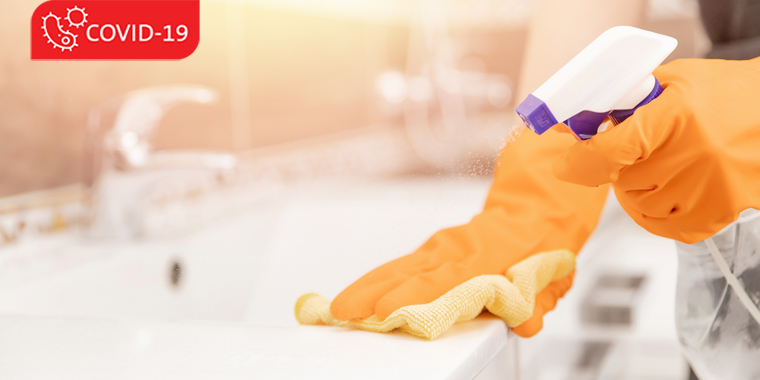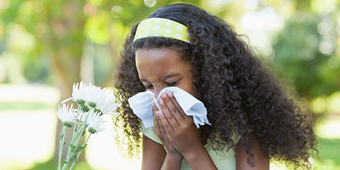Spring Cleaning: Healthy Home, Healthy Mind

Find Your Perfect Match
Answer a few questions and we'll provide you with a list of primary care providers that best fit your needs.
After a year of staying (mostly) at home, spring cleaning takes on extra importance this spring.
“A deep spring cleaning is important in any year, but especially this year. It can also improve our mood, reduce stress, and boost our immune system,” says Kevin Baker, MSN, FNP-BC, a nurse practitioner at Premier Health Rheumatology and Premier Health Family Care of Vandalia.
Dust and dust mites, pet dander, mold, and other allergens build up in our homes during the winter months. These particles can trigger allergy and asthma symptoms.
If you live in a newer, “closed-envelope” home equipped with airtight windows and doors, your indoor air may contain even more irritants that cause hay fever and respiratory issues, says the Centers for Disease Control and Prevention.
A good spring cleaning can reduce these effects, says Baker.
How, When And Where To Clean
You can throw open the windows, let in the sunshine and dust all day, but be smart about it.
Dust before you vacuum, so that the vacuum can collect anything that falls on the floor. Use damp cloths designed to trap the dust.
Dust includes the skin that we naturally shed, tiny dust mites, and their fecal matter. It’s that fecal matter that causes allergic reactions and triggers asthma, Baker says.
“Be sure to clean all those places you might not usually clean, like under the bed, the corners in closets and along baseboards,” Baker says. “That where dust bunnies build up.”
A deep spring cleaning should also focus on places where bacteria may live, like the kitchen and bathroom. Be sure to wipe down and sanitize:
- Bathroom surfaces
- Cabinet pulls
- Door handles
- Kitchen appliances
- Remote controls and gaming devices
- Showers
- Toilets
Pay special attention when cleaning your bedroom, Baker says. We move around the house during the day, but we spend extended hours at night sleeping in the bedroom.
Follow these tips for a deep clean and reducing allergens in your home.
Open Your Windows With Care
It’s good to air out your home, Baker says. But you want to find a balance between letting fresh air in and preventing more outside allergens — like tree pollen in the spring and ragweed in the fall — from coming into your house.
There are apps that track the pollen count in your area. You can use these apps as a guide. Baker recommends the Pollen.com app Allergy Alert. If pollen counts are high on a certain day, keep the windows closed.
Paying attention to air quality makes sense for Dayton-area residents, Baker says. Dayton is a tough place to live if you have allergies or asthma, according to the Asthma and Allergy Foundation of America.
The foundation’s recent Allergy Capitals and Asthma Capitals reports rank Dayton as the:
- 2nd most challenging place to live with asthma in the U.S.
- 15th most challenging region to live in the nation if you have allergies
The rankings are based on health care data, pollen counts, prescription medicine use, and over-the-counter sales of allergy and sinus medicines.
When you do open the windows at home, be sure to let the sun in, Baker says. Sunlight can kill and deter dust mites and bacteria. Baker recommends vacuuming again after you close the windows to pick up any allergens that came in with the breeze.
Filter Your Indoor Air
You can create better air in your home by using efficient filters in your HVAC system and your vacuum.
Look for allergy and asthma-friendly furnace filters that carry the smiley face logo, Baker says. Or use high-efficiency pleated filters.
Replace your filters as part of your spring cleaning. It’s important to follow the recommended replacement schedule for your filters. Typically, allergy and asthma friendly filters last 90 days. Pleated filters are good for 30 days.
“Don’t use the filters for longer than recommended because of the amount of pollen and allergens in the air,” Baker says.
If possible, use a vacuum with a HEPA filter. These filters trap up to 99.7% of large particles like dust and dust mites, floating in the air. Remember to change your vacuum filters regularly, too.
Clean Up And Improve Your Mood
There’s something to be said for cleaning and how it makes us feel. And anything that improves our mood after a year of fighting COVID-19 is a good thing, Baker says.
“You know how you feel after you clean the house. You feel better in a less cluttered space,” Baker says. “We know this reduces stress and decreases depression.”
Giving your home a deep clean can also strengthen your immune system as you get rid of allergens, bacteria, and dust. This is especially important if you or a loved one is living with asthma or other respiratory or pulmonary conditions.
The act of cleaning also leads to a healthier lifestyle. Baker reminds us to check on older family and friends, parents and grandparents, who might need help with spring cleaning.
“We can help others clean up and pick up, remove shoes by the front door,” Baker says. “This can decrease the risk of falls, and it makes you feel good to help someone else.”
Not to mention how much better we all feel when we spend time with others and strengthen our relationships.
Find Your Perfect Match
Answer a few questions and we'll provide you with a list of primary care providers that best fit your needs.
Sources: Kevin Baker, MSN, FNP-BC, nurse practitioner, Premier Health Rheumatology and Premier Health Family Care of Vandalia; Asthma and Allergy Foundation of America; Centers for Disease Control and Prevention; CNN





